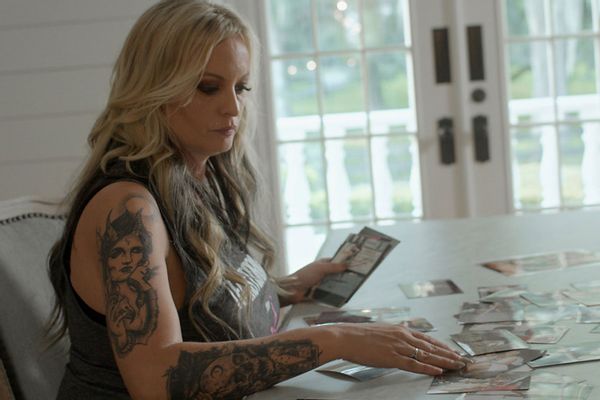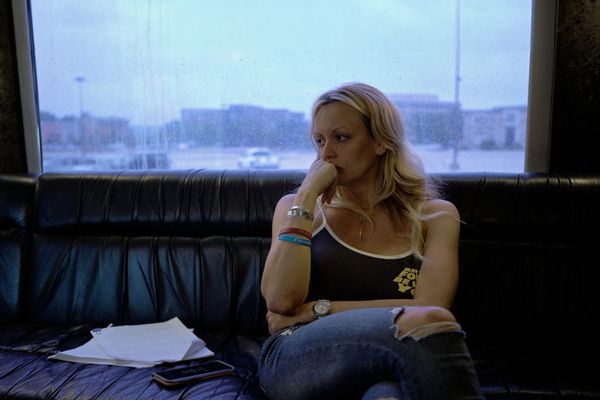
Throughout “Stormy” we’re shown the many ways Stormy Daniels has been co-opted to suit others’ purposes. To right-wing bullies, she’s a safe target for venom and death threats.
To her one-time lawyer Michael Avenatti, she was a ticket to the national stage.
For a time, she was a symbol of the #MeToo movement and a great hope for white feminists battling Trump, despite her being a registered Republican.
At this moment, she’s at the heart of a New York criminal trial charging Trump with falsifying business records connected to paying off Daniels to remain quiet about their 2006 affair during his 2016 campaign. It was set to go to court this week but was delayed for another month.
No matter the time or context, Daniels is an effective distraction. Adult film stars aren’t considered to be fully human, Daniels says. That makes her a prop to be hoisted when it’s convenient for a particular constituency and abandoned at will.
Avenatti proved that by loudly playing her biggest advocate only to cost her dearly. Without her knowledge or consent, he filed a defamation suit against Trump that Avenatti announced on Twitter which he then lost, along with an appeal. A judge ordered Daniels to pay Trump’s legal fees, a tally that currently sits at more than $600,000.
That public defeat became the first domino that knocked down sales of her once-bestselling book, “Full Disclosure.” The same people who once supported her said they wouldn’t buy it, knowing the proceeds would be going to Trump.
As for Avenatti, he’s serving time for defrauding and extorting several entities and former clients – including Daniels, from whom he stole nearly $300,000.
Daniels, meanwhile, can’t find a moment’s peace. She’s still on the hook to pay back Trump. The trial reignited his cult’s hatred for her, forcing her to uproot her life again. Someone shot a rubber bullet at one of her horses, hoping to lure her into the open. She fears for her daughter’s safety.

She would go on to appear on “60 Minutes,” giving the news magazine its highest ratings in more than a decade. A “Saturday Night Live” cold open followed, and then she sold out strip clubs across the country as a featured headliner. This wasn’t a deviation from how she earned money before Trump hauled her into the spotlight, she says in "Stormy." “If you drive an ice cream truck . . . and you don’t drive it the week of a heat wave, you’re an idiot,” she deadpanned.
If you didn’t already know it, or assumed otherwise, “Stormy” establishes the woman isn’t dumb. But she is exhausted from being politically and monetarily exploited.
Much more than that, she says she is frustrated that the justice system has failed her at each turn, both the ones we know about and others revealed in Sarah Gibson’s documentary, which she co-produced with Erin Lee Carr (“Mommy Dead and Dearest”).
But as MSNBC pundit Rachel Maddow reminds us, “The issue is not her. The issue is the crime.”
The hush-money charges are among the 91 felony counts Trump is currently facing, and one of several cases in which women play a prominent role either on the prosecutorial side or, in Daniels’ case, as a star witness. He has relished threatening their lives and professional reputations.
At the height of the scandal, news vehicles were parked in front of Daniels' house and photographers followed her. In one scene she’s unable to stop reading aloud explicit death threats against her and her family posted on social media from accounts that no longer bother to mask their identity. Their users know nothing will happen to them.
Her situation isn’t terribly dissimilar to other women who have since gone public with accounts of politically powerful men who they allege to have sexually abused or assaulted them.
E. Jean Carroll, for example, may receive some monetary remedy from Trump after a civil jury found him liable of sexual abuse, battery and defamation, but any sense of safety she might have felt before she went public has surely vanished.

“He told me that I reminded him of his daughter . . . I thought we had this mutual respect,” she said, “which is why it was so crazy when having no red flag whatsoever in a conversation, I came out of a bathroom to find myself cornered.
“I don’t remember how I got in the bed, and the next thing I know, it was humping away and telling me how great I was,” Daniels continued. “It was awful. But I didn’t say no.” (Trump has always officially denied having any relationship with Daniels.)
Later in the film she makes a connection between Trump’s infamous statement in that infamous "Access Hollywood" tape statement” and that uninvited sexual interlude. She realizes that she could have put up a fight but didn’t, perhaps because she was raised not to question powerful men.
People want to believe what they want to believe, no matter what, she says. And many do. Among those who appear in the documentary to speak on her behalf are Seth Rogen, whom she befriended while working on “Knocked Up” (a film by Judd Apatow, an executive producer on “Stormy”), and Jimmy Kimmel.
Believing doesn’t necessarily translate to supporting the woman’s account. As my Salon colleague Amanda Marcotte has pointed out the MAGA faithful is entirely fine with Trump having assaulted women or his extramarital affairs because, to them, powerful men dominating women is the natural hierarchy upended by the feminist and the civil rights movements.
“Stormy” brings us inside a few headlines we may have forgotten in the blur of Trump outrage between 2016 and 2020, courtesy of footage from journalist Denver Nicks. His video constitutes the bulk of the candid scenes featured in “Stormy”; he began filming Daniels around the same time as the “60 Minutes” interview, and they eventually became romantically involved, contributing to her divorce from her third husband Brendon Miller.
He’s present, for example, when Daniels was arrested in Columbus, Ohio, after two undercover vice cops who were also Trump supporters asked her to rub her breasts in their face, thereby luring her into committing a crime.
The charges were dropped, but not before police took her mugshot. She went on to receive $450,000 to settle a suit accusing the city of Columbus of civil rights violations.
In 2019 she was also denied entry into Canada after 17 false felony charges appeared on her FBI record; her interaction with a border officer was captured via cellphone footage. More than a nuisance, this further curtailed her ability to make a living since she understood that if the wrong person pulled her over, she could be jailed.

Thus it’s understandable that the defiant Daniels we meet at the beginning of the documentary is unbowed but tattered by the end of “Stormy,” regretting that she ever spoke out because of what it cost her. She won’t give up, she says, because she’s telling the truth.
But, as she tells a pair of "Good Morning Britain" hosts during a recent visit to the U.K., “Nobody cares what the truth is anymore.”
One of the presenters asks, “Are you frightened?”
“Yes,” she answers. “I think we all should be.”
"Stormy" is now streaming on Peacock.







